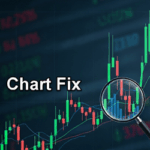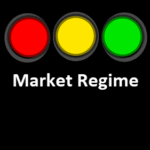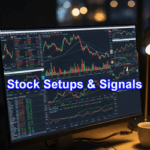Recent Reports on TrendInvestorPro

Trend Trio Indicator – Time Frame, Signals and Charting on StockCharts ACP
The Trend Trio150 is a trend-following indicator that aggregates signals in three trend-following indicators. It uses the principle of confirmation by requiring at least two trend signals to turn bullish or bearish. This also means it

Large-Cap Dominoes Fall – Finance Joins the Fray – Money Moves into Utes and Bonds
The dominoes continue to fall within the large-cap tech universe as QQQ breaks a benchmark low. Weakness is spreading into the broader market as finance (XLF) plunges and SPY tests first support. Meanwhile, money is moving into safe-haven bonds and defensive utilities. $SPY $RSP $QQQ $MAGS $XLK $XLF $XLU $IEF

Moment of truth for Bonds – Copper and Base Metals ETFs Set Up – Bitcoin Oversold
Precious and industrial metals continue to lead in 2026, but gold and silver turned very volatile the last few weeks. Meanwhile, copper and base metals are simply consolidating. Symbols covered: $IEF, $GLD, $SLV, $GDX, $SIL, $CPER, $DBB, $COPX, $SRUUF, $URA and $IBIT.

S&P 500, Nasdaq 100 and S&P 1500 Breadth Models – Yields Spreads – Fed Policy
The Market Regime page defines the stock market environment: bull or bear market. Three breadth/trend models quantify performance for stocks in the S&P 500, Nasdaq 100 and S&P 1500. Yield spreads capture credit market conditions, while Treasury yield trends reflect Fed policy.

Three Stocks from Strong Groups: Homebuilding, Defense and Utilities
Stocks remain in bull mode with the broadening trade dominating. Hard assets are in, and soft things are out. Today’s report covers DR Horton $DHI, Heico $HEI and Atmos Energy $ATO

EW SPX Hits New High – Housing Holds – Setups for Defense, Utes, Genomics and Space
The stock market remains in bull mode with the broadening trade working. There are setups in finance, utilities and defense, and uptrends in housing. Symbols covered: $RSP, $IWM, $ITB, $XHB, $IDGT, $XLF, $XLY, $XLU, $ITA, $ARKG, $IHI, $ARKX

Trend Signals Dow 30 Stocks and Sector SPDRs
This page shows Trend Trio150 signals for the Dow 30 stocks and the 11 sectors SPDRs. Updated every Saturday morning, this table keeps you on top of trend changes. There are columns for trend signals, signal date, change since signal, momentum and momentum change.

Bearish Reversal for QQEW – New Highs Surge as Low Vol Leads – Strength in EW Sectors
Money is moving out of Nasdaq 100 stocks and into more mundane parts of the stock market. It is not just a few large-caps in QQQ. We are seeing weakness throughout as the Nasdaq 100 Equal-Weight ETF (QQEW) formed and confirmed

Bond ETF Turns Down – Silver is Out of Control – First Support for Gold
Silver is out of control and ripe for a volatile correction. Gold and Gold Miners and other metals are also ripe. Bonds are breaking down. Symbols covered: $IEF, $GLD, $SLV, $GDX, $SIL, $CPER, $DBB, $COPX, $SRUUF, $URA and $IBIT.

A Small-Cap Healthcare Stock and Homebuilder – A Large-cap Hospital Operator
The weight of the evidence remains bullish for stocks, but areas of the market are under extreme pressure (software, cybersecurity, cloud, fintech, crypto). TransMedics $TMDX, HCA Healthcare $HCA and M/I Homes $MHO

S&P 500, Nasdaq 100 and S&P 1500 Breadth Models – Yields Spreads – Fed Policy
The Market Regime page defines the stock market environment: bull or bear market. Three trend/breadth models quantify performance for stocks in the S&P 500, Nasdaq 100 and S&P 1500. Yield spreads capture credit market conditions, while Treasury yield trends reflect Fed policy.

A Pop-Drop for XLK – Setups in Finance, Healthcare, Medical Devices, Housing, India
There is no change to our weight of the evidence chart. SPY hit a new high last week and is trading near this high. Names hitting new highs are on strong uptrends. Some 65% of S&P 500 stocks

Finance SPDR Takes a Hit, but Maintains Uptrend as Trading Setup Emerges
The Finance SPDR was hit hard the last few weeks, but remains in an uptrend overall. In fact, the ETF is oversold within this uptrend and oversold conditions present traders with opportunities

IEF Battles 200-day SMA – Precious Metals ETFs Extend Moonshots – Bitcoin Languishes
Precious metals continue to lead as gold, silver and their respective miners race to the moon. Since November, the Silver ETF (SLV) is up 140%…Symbols covered: IEF, GLD, SLV, GDX, SIL, CPER, DBB, , SRUUF, URA. IBIT.

Two Industrial Sector Stocks, Two Semiconductors and a Utility
Stocks remain in bull mode with leadership broadening. Industrials, Defense and Semis are leading, Utilities are turning up and the Technology SPDR came to life with a break above the mid January highs. Today’s report focuses on Fastenal FAST, GE Aerospace GE, Broadcom AVGO, Nvidia NVDA and AES Corp AES.

SPY, QQQ, XLK Hold the Line – Breakouts in XLV, IBB, IYZ – Setups in XLF, IDGT, IHI, CIBR
The weight of the evidence remains bullish for stocks. Dozens of ETFs hit new highs in January as the bull market broadened even further in January. Even though XLK and QQQ are lagging, they are still in uptrends and their cups are half full as earnings season gets in full swing.

A Four Point Plan Using the Market Analysis, the PPO and CCI to Find Robust Entry Points
Chartists interested building a position in a particular industry group ETF should consider this four point plan to find attractive entry points. First, the broad market environment should be bullish (bull market). Second, the name

IEF is Oversold at Support – Gold and Silver Get Extended – IBIT Tests Re-evaluation Level
The performance chart below shows the percentage/gain loss for 20 asset class ETFs (stocks, bonds, industrial metals, precious metals, agriculture and oil). Symbols covered: IEF, GLD, SLV, GDX, SIL, CPER, DBB, COPX, SRUUF, URA and IBIT.

Two Semiconductors, Two Healthcare Leaders and a Utility. XEL LLY MDT AMD MRVL
Stocks were hit hard on Tuesday, but the major index ETFs remain in uptrends with SPY still close to an all time high. Today’s report features stock setups for two semiconductor stocks, two healthcare stocks and a utility.

Key Levels for SPY/QQQ/XLK – Bonds Sag as Rates Surge – Euro Oversold within Uptrend
As hard as it is, this is the time to focus on the charts and ignore the news. It is not only difficult to interpret today’s news, but it is also impossible to predict tomorrow’s news. Sure, we can game out different scenarios and weigh the odds, but this is a tall order in the current environment.

Broadening Benefits Small-caps and Non-Tech, but Don’t Count XLK Out Just Yet
The bull market broadened in late November and this process continued into 2026. This year we are seeing breakouts in the Home Construction ETF (ITB) as well as new highs in the Retail SPDR (XRT) and Regional Bank ETF (KRE). Small-caps are leading

IEF Holds Uptrend – A Blowoff Top for Silver? – Bitcoin Forms Higher Low and Breaks Out
Metals-related ETFs led the markets higher in 2025 and continued their leadership role this year. The Silver ETF (SLV) is leaving everything in the dust this year with a 31% gain in

S&P 500, Nasdaq 100 and S&P 1500 Breadth Models – Yields Spreads – Fed Policy
The Market Regime page defines the stock market environment: bull or bear market. Three trend/breadth models quantify performance for stocks in the S&P 500, Nasdaq 100 and S&P 1500. Yield spreads capture credit market conditions, while Treasury yield trends reflect Fed policy.

LabCorp, Quest Diagnostics, Palo Alto Networks, CrowdStrike and Cisco
This report features stock setups for two cybersecurity stocks, two healthcare stocks and a networking leader. Symbols covered: LH, DGX, PANW, CWRD and CSCO
